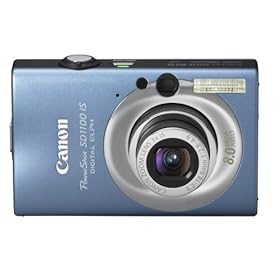 If you need a solid, reliable, and stylish point-and-shoot ultracompact digital camera that produces high-quality images, then the new Canon PowerShot SD1100IS may be right for you.
If you need a solid, reliable, and stylish point-and-shoot ultracompact digital camera that produces high-quality images, then the new Canon PowerShot SD1100IS may be right for you.
I am an advanced amateur photographer and own 2 Canon digital cameras (G2 and 20D).Both have served me well over the years but recently I have found myself needing a decent ultracompact camera that I can easily carry with me at all times for unexpected photo-ops.
Other current Canon models that I also researched before my purchase of the "bohemian brown" SD1100IS included the SD950IS and the SD1000.
Here is my take on the SD1100IS:
Strengths:
- 8MP CCD sensor with DigicIII processor (excellent resolution images with good dynamic range)
- Solid construction (most of body made of anodized aluminum)
- Feels sturdy and well-balanced in the hands
- Easy to use (logical user-interface) with minimal need to consult owner's manual for basic operation
- Multiple shooting modes to fit variety of situations (action/sports mode is a glaring omission but read section below to see possibly why)
- Advanced metering system with accurately exposed pics in even "tricky" situations (great balance of highlights and shadows)
- Tack-sharp images (much more so with sufficient lighting and use of built-in flash)
- Macro mode can result in stunning close-ups with outstanding level of detail
- Optical IS feature helpful when shooting in either low-light conditions with flash off or at telephoto lengths
- Fast start-up with acceptable shutter-lag (when not using flash)
- Bright 2.5" LCD monitor (100% coverage, 230k pixels) made of polycrystalline silicon; fairly scratch-resistant (can't vouch if this applies to keys and coins)
- Optical viewfinder (though only a tiny peephole, it is essential when LCD glare and washout become an issue shooting in bright sunlight or when LCD cannot be used as battery power is nearly depleted)
- Camera made in Japan (at least those from the 1st shipment; this easily may be subject to change)
Limitations:
- Lack of manual control over aperture, shutter speed, and focusing (for the obssessive control-freaks)
- Noise is noticeable beginning at ISO 400 (ISO 800 still useable but probably for only 4x6 images; ISO 1600 mostly unuseable)
- Fastest shutter speed is 1/1500 sec (not fast enough to stop action for some sporting activities)
- Auto-focus speed inadequate to follow fast-moving subjects
- Shutter-lag accentuated with flash on (precious Canon moments lost while waiting for flash to recharge)
- Cannot adjust focus or optical zoom while shooting in movie mode (focus is fixed for distance selected at first frame, and digital zoom is permitted instead, resulting in significant image quality deterioration)
- Battery/memory card cover and hinge made of plastic (no safety latch that needs to be de-activated first before sliding cover out, in order to prevent accidental opening)
- Minor vignetting and chromatic aberration (albeit, difficult not to expect from compact p&s)
- Pincushion and barrel distortion at the extremes of the focal lengths
- No RAW shooting mode
Battery power in camera mode with LCD monitor on is mostly as advertised, allowing for approximately 240 images.If your budget permits, I recommend investing in a few spare batteries as backups and replacing the supplied 32MB memory card with a pair of 4GB SDHC memory cards--vital purchases if you plan to use the movie mode frequently.
Overall Impression:
Even with some serious limitations inherent to virtually all digital cameras in this class, I am recommending the Canon PowerShot SD1100IS.It does what it's supposed to do.This camera allows one to take beautiful photographs in an ultracompact, reliable, and elegant device that is both easy and fun to use.
[UPDATE: Since this review, Canon has recently announced 3 new ELPH models that will be released soon....in time for Grad & Dad's Day: the PowerShot SD770IS, SD790IS, and SD890IS.All are redesigned 10MP digital cameras with Optical Image Stabilizer.The saga of the MP race continues.If the same sensor is found in these units as their predecessors and without improving the noise reduction technology, then adding a few more MP can potentially result in noisier images.We'll have to wait and see.The most intriguing of the bunch appears to be the SD790IS, which replaces the SD750 by adding the very useful Optical IS feature and showcasing flat control buttons.Hopefully, the QC has been remedied on this unit as many consumers experienced the dreaded "lens error" nightmare.The SD890IS replaces the SD850IS and may appeal to vacationers and wildlifers needing more reach at the telephoto end.The SD770IS seems a bit curious as it may be in direct competition with the new SD1100IS (which is the natural successor to the wildly popular SD1000); it has 2 additional MP but the feature set appears at first glance to be nearly identical to the less expensive SD1100IS.I would've preferred to have seen upgrades to the SD870IS and the SD950IS, but those will be rolled out undoubtedly later this year....conveniently before the Holidays.
SD770IS: 10MP, 3X Optical zoom (35-105mm), 2.5" LCD monitor, Optical viewfinder, ISO 1600, MSRP $299.99.
SD790IS: 10MP, 3X Optical zoom (35-105mm), 3" LCD monitor, no Optical viewfinder, ISO 1600, MSRP $349.99.
SD890IS: 10MP, 5X Optical zoom (37-185mm), 2.5" LCD monitor, Optical viewfinder, ISO 1600, MSRP $399.99.]
See more reviews about: Canon PowerShot SD1100IS 8MP Digital Camera with 3x Optical Image Stabilized Zoom (Blue)
Canon PowerShot SD1100IS 8MP Digital Camera (Blue) Review
Posted by Canon Reviews | 07:29 | Canon Cameras, Canon PowerShot SD1100IS, Digital Camera, Optical Zoom | 0 comments »
Subscribe to:
Post Comments (Atom)




0 comments
Post a Comment